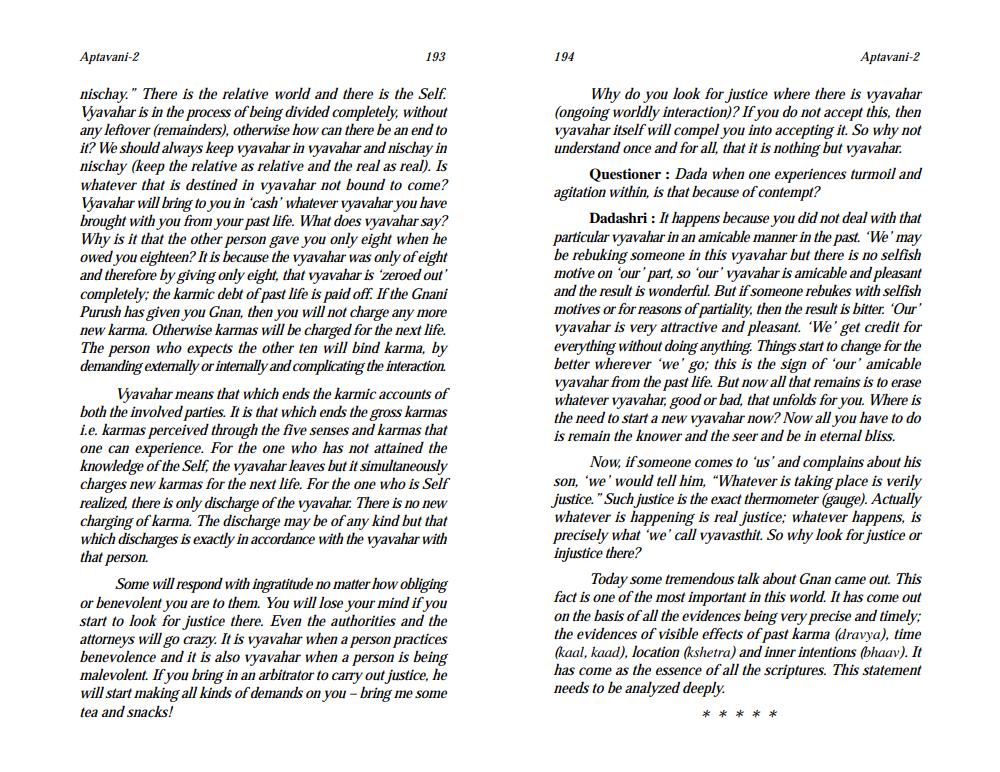________________
Aptavani-2
193
194
Aptavani-2
nischay." There is the relative world and there is the Self. Vyavahar is in the process of being divided completely, without any leftover (remainders), otherwise how can there be an end to it? We should always keep vyavahar in vyavahar and nischay in nischay (keep the relative as relative and the real as real). Is whatever that is destined in vyavahar not bound to come? Vyavahar will bring to you in 'cash' whatever vyavahar you have brought with you from your past life. What does vyavahar say? Why is it that the other person gave you only eight when he owed you eighteen? It is because the vyavahar was only of eight and therefore by giving only eight, that vyavahar is 'zeroed out' completely; the karmic debt of past life is paid off. If the Gnani Purush has given you Gnan, then you will not charge any more new karma. Otherwise karmas will be charged for the next life. The person who expects the other ten will bind karma, by demanding externally or internally and complicating the interaction.
Vyavahar means that which ends the karmic accounts of both the involved parties. It is that which ends the gross karmas i.e. karmas perceived through the five senses and karmas that one can experience. For the one who has not attained the knowledge of the Self, the vyavahar leaves but it simultaneously charges new karmas for the next life. For the one who is Self realized, there is only discharge of the vyavahar. There is no new charging of karma. The discharge may be of any kind but that which discharges is exactly in accordance with the vyavahar with that person.
Why do you look for justice where there is vyavahar (ongoing worldly interaction)? If you do not accept this, then vyavahar itself will compel you into accepting it. So why not understand once and for all, that it is nothing but vyavahar.
Questioner : Dada when one experiences turmoil and agitation within, is that because of contempt?
Dadashri : It happens because you did not deal with that particular Vyavahar in an amicable manner in the past. 'We may be rebuking someone in this vyavahar but there is no selfish motive on our' part, so 'our' vyavahar is amicable and pleasant and the result is wonderful. But if someone rebukes with selfish motives or for reasons of partiality, then the result is bitter. 'Our' vyavahar is very attractive and pleasant. 'We get credit for everything without doing anything. Things start to change for the better wherever 'we' go, this is the sign of four' amicable vyavahar from the past life. But now all that remains is to erase whatever vyavahar, good or bad, that unfolds for you. Where is the need to start a new vyavahar now? Now all you have to do is remain the knower and the seer and be in eternal bliss.
Now, if someone comes to 'us' and complains about his son, 'we would tell him, "Whatever is taking place is verily justice. "Such justice is the exact thermometer (gauge). Actually whatever is happening is real justice; whatever happens, is precisely what 'we' call vyavasthit. So why look for justice or injustice there?
Today some tremendous talk about Gnan came out. This fact is one of the most important in this world. It has come out on the basis of all the evidences being very precise and timely: the evidences of visible effects of past karma (dravya), time (kaal, kaad), location (kshetra) and inner intentions (bhaav). In has come as the essence of all the scriptures. This statement needs to be analyzed deeply.
Some will respond with ingratitude no matter how obliging or benevolent you are to them. You will lose your mind if you start to look for justice there. Even the authorities and the attorneys will go crazy. It is vyavahar when a person practices benevolence and it is also vyavahar when a person is being malevolent. If you bring in an arbitrator to carry out justice, he will start making all kinds of demands on you bring me some tea and snacks!




